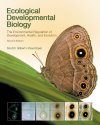About this book
The new evolutionary science created by studying the relationships between genes, developing organisms, and their environments is called ecological evolutionary developmental biology (eco-evo-devo). Ecological Developmental Biology documents the evidence for a new, extended, evolutionary synthesis, a synthesis that: confounds the creationist belief that evolution can't be described above the species-level; integrates aging and 'Western' diseases such as diabetes, atherosclerosis, cancer, and obesity into an evolutionary context; and sees interspecies interactions both within the organism and between organisms as being critical for evolution, development, and fitness.
Ecological Developmental Biology is the only book that, in one place:
- Details the three main epigenetic sources of phenotype: symbionts, altered chromatin structure, and plasticity.
- Discusses the various ways that development can be disrupted: teratogens, endocrine disruptors, global climate change, and mismatches between diet and environment.
- Documents the evidence for an extended evolutionary synthesis involving the modern synthesis, evo-devo, and eco-evo-devo
Contents
PART I: ENVIRONMENTAL SIGNALS AND NORMAL DEVELOPMENT The Environment as a Normal Agent in Producing Phenotypes How Agents in the Environment Effect Molecular Changes in Development Developmental Symbiosis: Co-Development as a Strategy for Life Embryonic Defenses: Survival in a Hostile World PART II: ECOLOGICAL DEVELOPMENTAL BIOLOGY AND DISEASE STATES Teratogenesis: Environmental Assaults on Development Endocrine Disruptors The Epigenetic Origin of Adult Diseases PART III: TOWARD A DEVELOPMENTAL EVOLUTIONARY SYNTHESIS The Modern Synthesis: Natural Selection of Allelic Variation Evolution through Developmental Regulatory Genes Environment, Development, and Evolution: Toward a New Synthesis CODA: Philosophical Concerns Raised by Ecological Developmental Biology APPENDX A: Lysenko, Kammerer, and the Truncated Tradition of Ecological Developmental Biology APPENDIX B: The Molecular Mechanisms of Epigenetic Change APPENDIX C: Writing Development Out of the Modern Synthesis APPENDIX D: Epigenetic Inheritance Systems: The Inheritance of Environmentally Induced Traits
Customer Reviews
Biography
Scott F. Gilbert, a Senior Research Associate at Swarthmore College and the Finland Distinguished Professor at the University of Helsinki Institute of Biotechnology, teaches developmental biology, developmental genetics, and the history of biology. After receiving his B.A. from Wesleyan University, he pursued his graduate and postdoctoral research at The Johns Hopkins University and the University of Wisconsin. Dr Gilbert is the recipient of several awards, including the first Viktor Hamburger Award for excellence in developmental biology education, the 2004 Alexander Kowalevsky Prize for evolutionary developmental biology, honorary degrees from the Universities of Helsinki and Tartu, and the Medal of François I from the Collège de France. He is a Fellow of the American Association for the Advancement of Science, a corresponding member of the St. Petersburg Society of Naturalists, and has been chair of the Professional Development and Education Committee of the Society for Developmental Biology. His research pursues the developmental genetic mechanisms by which the turtle forms its shell.
David Epel is the Jane and Marshall Steel Jr. Professor Emeritus of Biological Sciences at Stanford University`s Hopkins Marine Station in Pacific Grove CA. He did his undergraduate studies at Wayne State University and then graduate and postdoctoral studies at the University of California, Berkeley and the University of Pennsylvania. Dr Epel has been a Guggenheim Fellow, is a Fellow of the American Association for the Advancement of Science, the California Academy of Sciences, and an Overseas Fellow of Churchill College and Life Fellow of Clare Hall at the University of Cambridge. His honours include the Cox Medal for Fostering Undergraduate Research at Stanford and the Ed Ricketts Memorial Award for Lifetime Achievement in the Marine Sciences. Epel's research focused on the cell biology of development, especially the activation of the egg at fertilization, the unique physiology of the embryo and the cellular mechanisms of embryo protection. His current interest is high school science education. One area is highlighting early development of the sea urchin embryo to capture the imagination and interest of high school students. New curricula focus on the science of climate change and how students can help to solve this problem.






















![Kame no Kōra wa Abarabone: Jintai de Arawasu Ugokumonozukan [Turtle Shells Have Ribs: A Picture Book of Animal Anatomy Represented by the Human Body]](http://mediacdn.nhbs.com/jackets/jackets_resizer_medium/24/249897.jpg?height=150&width=99)










